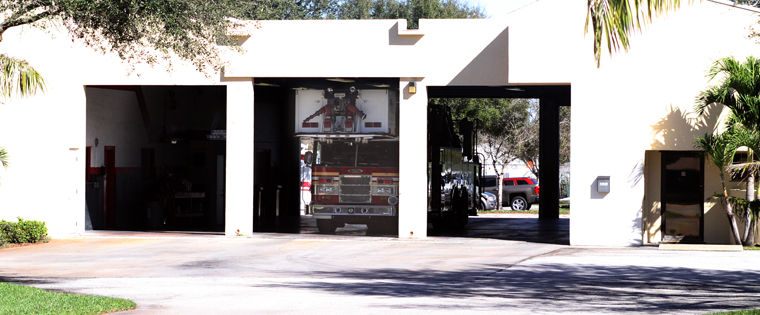
INDIAN RIVER COUNTY — The union representing Indian River County’s firefighters and paramedics on Tuesday released more than 200 pages of investigation reports on four fire stations and, based upon the findings has told county officials firefighters need to be moved to safer housing.
High levels of mold were found in the living areas of all four stations. Problems found range from mold growth in air-conditioning systems, mold from leaky roofs and vents to moisture seeping through the walls from earthen berms. Accompanying each report are dozens of photos documenting the findings.
Indian River County has also received results of tests performed nearly two months ago by their own team. Though the sampling was not as extensive as that performed by the union’s team, the County’s experts also found substantial mold at all four stations. The union also brought in a structural engineer to document deficiencies in the construction or maintenance of the buildings that could likely have let water in, creating conditions for the mold to grow.
“The results demonstrate clearly that all four stations are contaminated and that no firefighters should be working in any of them,” said John O’Connor, a 15-year firefighter and paramedic who heads up the local union chapter. As President of the Local I have no choice but to demand that the County remove all firefighters from these stations and place them into temporary facilities.”
With regard to moving firefighters out of the stations, County Administrator Joe Baird did not immediately respond on Tuesday to a request for the estimated arrival date and anticipated ready date of the modular housing.
But as of last week, Baird said the customized modular housing units that the County ordered for two of the stations were still being built. Fire Chief John King recommended firefighters at Fellsmere Station 10 and Orchid Station 11 shelter in place during renovations, so the County did not order modular housing for those two stations as staff said the repairs would be completed before the modulars arrived.
“Continuing to allow firefighters to work in these stations is not only foolish but inhumane,”O’Connor said Tuesday. “Many of my members are already dealing with medical problems that appear to be related to chronic exposure to mold and bacteria. They are rightfully concerned that continued exposure to environmental toxins in these stations will compound the health issues they are already experiencing.”
O’Connor is one of more than 70 firefighters who have filed workers’ compensation claims for mold exposure and one of 14 who have tested positive for mold-related toxins in his system, as detected by urinalysis.
Firefighters say there has been long-standing visible mold that was reported up the chain of command in Orchid Station 11, Fellsmere Station 10, Ranch Road Station 7 and Dixie Highway Station 1 in Vero Beach, with some of the water intrusion into the buildings dating back to damage sustained in the 2004 and 2005 hurricanes.
County Administrator Joe Baird alleges that firefighters only made an issue out of the station conditions after the union and the County reached an impasse on a 2013 contract in May 2014.
“The problems with these stations have been obvious for years, but the County has ignored the seriousness of this issue to the obvious detriment of my membership, and to the detriment of the health, safety and welfare of the public at large,” O’Connor said. “The troubling test results confirm extensive amounts of both mold and bacteria in these environments that can have catastrophic health consequences. “
Two teams of environmental hazard experts – one team hired by the County and one hired by the International Association of Fire Fighters Local 2201 – inspected the four stations the week of March 30 and sent various types of samples back to the lab for analysis. Up until then, the union and the County could not agree upon the terms by which the union’s own inspectors would be granted access to the stations.
The County commissioned preliminary tests of the four stations in the fall of 2014, but staff did not order modular housing until after a 14-hour impasse hearing with the union in mid-March when the conditions of the fire stations became a bone of contention.
The Board of County Commissioners approved an initial $250,000, and last week another $200,000 to expedite getting firefighters out of the stations.
O’Connor said the reports have now been shared with the County and are available to the public.



